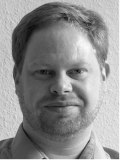GOTO is a vendor independent international software development conference with more that 90 top speaker and 1300 attendees. The conference cover topics such as .Net, Java, Open Source, Agile, Architecture and Design, Web, Cloud, New Languages and Processes
Sebastian Egner, TweetHead of application development at Entelios AG

Biography: Sebastian Egner
Sebastian Egner is a scientist, inventor, and engineer, and he insists that these professions should not be confused. Currently, he leads a team of software experts at Entelios AG, a young company devoted to "moving energy" (in the power grid) to where it is needed most. After his education in Physics (M.Sc) and computer science (Ph.D), he has worked in diverse areas related to computer science, mathematics and physics. This includes, among other things, designing reliable communication systems (channel coding), integrating surface science equipment, and prototyping lighting gadgets for TV sets, the descendents of which are offered in your local retail store.
Presentation: TweetProgramming Languages and the Power Grid
The topic of this presentation is software connected to the electric power grid. It is the story of an application area in need of modern programming languages, rather than the other way around.
The young company Entelios AG in Berlin, has developed a complex piece of software to help stabilize the grid by reducing demand at times of short supply. The software has been designed based on the principle of 'choosing the right language for the job', and the reasoning behind some critical design choices will be explained. But while the reasoning at the time of design determines our choices, it is the confrontation with the practical outcomes of these choices that guides our learning and how improvements and future systems should be implemented. This design and engineering approach will be a major theme of the presentation.
The second major theme of the presentation is the type of software employed in the power grid in general. Obviously, the power grid does already represent a well developed software ecosystem ranging from (hard) real-time systems to business IT solutions. Since a national power grid is a system with engineering of highest complexity it would be presumptuous to attempt any kind of exhaustive overview. Yet, it turns out that 'internet technology', which is currently confined to the GUI side of the business IT solutions in this area, seems to have matured to the point where it can---cautiously!---be deployed closer to the beating heart of the power grid.
